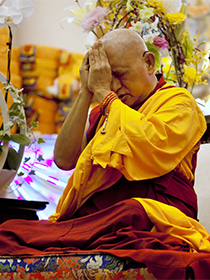- Home
- FPMT Homepage
Foundation for the Preservation of the Mahayana Tradition
The FPMT is an organization devoted to preserving and spreading Mahayana Buddhism worldwide by creating opportunities to listen, reflect, meditate, practice and actualize the unmistaken teachings of the Buddha and based on that experience spreading the Dharma to sentient beings. We provide integrated education through which people’s minds and hearts can be transformed into their highest potential for the benefit of others, inspired by an attitude of universal responsibility and service. We are committed to creating harmonious environments and helping all beings develop their full potential of infinite wisdom and compassion. Our organization is based on the Buddhist tradition of Lama Tsongkhapa of Tibet as taught to us by our founders Lama Thubten Yeshe and Lama Thubten Zopa Rinpoche.
- Willkommen
Die Stiftung zur Erhaltung der Mahayana Tradition (FPMT) ist eine Organisation, die sich weltweit für die Erhaltung und Verbreitung des Mahayana-Buddhismus einsetzt, indem sie Möglichkeiten schafft, den makellosen Lehren des Buddha zuzuhören, über sie zur reflektieren und zu meditieren und auf der Grundlage dieser Erfahrung das Dharma unter den Lebewesen zu verbreiten.
Wir bieten integrierte Schulungswege an, durch denen der Geist und das Herz der Menschen in ihr höchstes Potential verwandelt werden zum Wohl der anderen – inspiriert durch eine Haltung der universellen Verantwortung und dem Wunsch zu dienen. Wir haben uns verpflichtet, harmonische Umgebungen zu schaffen und allen Wesen zu helfen, ihr volles Potenzial unendlicher Weisheit und grenzenlosen Mitgefühls zu verwirklichen.
Unsere Organisation basiert auf der buddhistischen Tradition von Lama Tsongkhapa von Tibet, so wie sie uns von unseren Gründern Lama Thubten Yeshe und Lama Thubten Zopa Rinpoche gelehrt wird.
- Bienvenidos
La Fundación para la preservación de la tradición Mahayana (FPMT) es una organización que se dedica a preservar y difundir el budismo Mahayana en todo el mundo, creando oportunidades para escuchar, reflexionar, meditar, practicar y actualizar las enseñanzas inconfundibles de Buda y en base a esa experiencia difundir el Dharma a los seres.
Proporcionamos una educación integrada a través de la cual las mentes y los corazones de las personas se pueden transformar en su mayor potencial para el beneficio de los demás, inspirados por una actitud de responsabilidad y servicio universales. Estamos comprometidos a crear ambientes armoniosos y ayudar a todos los seres a desarrollar todo su potencial de infinita sabiduría y compasión.
Nuestra organización se basa en la tradición budista de Lama Tsongkhapa del Tíbet como nos lo enseñaron nuestros fundadores Lama Thubten Yeshe y Lama Zopa Rinpoche.
A continuación puede ver una lista de los centros y sus páginas web en su lengua preferida.
- Bienvenue
L’organisation de la FPMT a pour vocation la préservation et la diffusion du bouddhisme du mahayana dans le monde entier. Elle offre l’opportunité d’écouter, de réfléchir, de méditer, de pratiquer et de réaliser les enseignements excellents du Bouddha, pour ensuite transmettre le Dharma à tous les êtres. Nous proposons une formation intégrée grâce à laquelle le cœur et l’esprit de chacun peuvent accomplir leur potentiel le plus élevé pour le bien d’autrui, inspirés par le sens du service et une responsabilité universelle. Nous nous engageons à créer un environnement harmonieux et à aider tous les êtres à épanouir leur potentiel illimité de compassion et de sagesse. Notre organisation s’appuie sur la tradition guéloukpa de Lama Tsongkhapa du Tibet, telle qu’elle a été enseignée par nos fondateurs Lama Thoubtèn Yéshé et Lama Zopa Rinpoché.
Visitez le site de notre Editions Mahayana pour les traductions, conseils et nouvelles du Bureau international en français.
Voici une liste de centres et de leurs sites dans votre langue préférée
- Benvenuto
L’FPMT è un organizzazione il cui scopo è preservare e diffondere il Buddhismo Mahayana nel mondo, creando occasioni di ascolto, riflessione, meditazione e pratica dei perfetti insegnamenti del Buddha, al fine di attualizzare e diffondere il Dharma fra tutti gli esseri senzienti.
Offriamo un’educazione integrata, che può trasformare la mente e i cuori delle persone nel loro massimo potenziale, per il beneficio di tutti gli esseri, ispirati da un’attitudine di responsabilità universale e di servizio.
Il nostro obiettivo è quello di creare contesti armoniosi e aiutare tutti gli esseri a sviluppare in modo completo le proprie potenzialità di infinita saggezza e compassione.
La nostra organizzazione si basa sulla tradizione buddhista di Lama Tsongkhapa del Tibet, così come ci è stata insegnata dai nostri fondatori Lama Thubten Yeshe e Lama Zopa Rinpoche.
Di seguito potete trovare un elenco dei centri e dei loro siti nella lingua da voi prescelta.
- 欢迎 / 歡迎
简体中文
“护持大乘法脉基金会”( 英文简称:FPMT。全名:Foundation for the Preservation of the Mahayana Tradition) 是一个致力于护持和弘扬大乘佛法的国际佛教组织。我们提供听闻,思维,禅修,修行和实证佛陀无误教法的机会,以便让一切众生都能够享受佛法的指引和滋润。
我们全力创造和谐融洽的环境, 为人们提供解行并重的完整佛法教育,以便启发内在的环宇悲心及责任心,并开发内心所蕴藏的巨大潜能 — 无限的智慧与悲心 — 以便利益和服务一切有情。
FPMT的创办人是图腾耶喜喇嘛和喇嘛梭巴仁波切。我们所修习的是由两位上师所教导的,西藏喀巴大师的佛法传承。
繁體中文
護持大乘法脈基金會”( 英文簡稱:FPMT。全名:Found
ation for the Preservation of the Mahayana Tradition ) 是一個致力於護持和弘揚大乘佛法的國際佛教組織。我們提供聽聞, 思維,禪修,修行和實證佛陀無誤教法的機會,以便讓一切眾生都能 夠享受佛法的指引和滋潤。 我們全力創造和諧融洽的環境,
為人們提供解行並重的完整佛法教育,以便啟發內在的環宇悲心及責 任心,並開發內心所蘊藏的巨大潛能 — 無限的智慧與悲心 – – 以便利益和服務一切有情。 FPMT的創辦人是圖騰耶喜喇嘛和喇嘛梭巴仁波切。
我們所修習的是由兩位上師所教導的,西藏喀巴大師的佛法傳承。 察看道场信息:
- FPMT Homepage
- News/Media
-
- Study & Practice
-
-
- About FPMT Education Services
- Latest News
- Programs
- New to Buddhism?
- Buddhist Mind Science: Activating Your Potential
- Heart Advice for Death and Dying
- Discovering Buddhism
- Living in the Path
- Exploring Buddhism
- FPMT Basic Program
- FPMT Masters Program
- FPMT In-Depth Meditation Training
- Maitripa College
- Lotsawa Rinchen Zangpo Translator Program
- Universal Education for Compassion & Wisdom
- Online Learning Center
-
- Prayers & Practice Materials
- Overview of Prayers & Practices
- Full Catalogue of Prayers & Practice Materials
- Explore Popular Topics
- Benefiting Animals
- Chenrezig Resources
- Death & Dying Resources
- Lama Chopa (Guru Puja)
- Lama Zopa Rinpoche: Compendium of Precious Instructions
- Lama Zopa Rinpoche: Life Practice Advice
- Lama Zopa Rinpoche Practice Series
- Lamrim Resources
- Mantras
- Prayer Book Updates
- Purification Practices
- Sutras
- Thought Transformation (Lojong)
- Audio Materials
- Dharma Dates - Tibetan Calendar
- Translation Services
- Publishing Services
- Ways to Offer Support
- Prayers & Practice Materials
-
- Teachings and Advice
- Find Teachings and Advice
- Lama Zopa Rinpoche Advice Page
- Lama Zopa Rinpoche: Compendium of Precious Instructions
- Lama Zopa Rinpoche Video Teachings
- ༧སྐྱབས་རྗེ་བཟོད་པ་རིན་པོ་ཆེ་མཆོག་ནས་སྩལ་བའི་བཀའ་སློབ་བརྙན་འཕྲིན།
- Podcasts
- Lama Yeshe Wisdom Archive
- Buddhism FAQ
- Dharma for Young People
- Resources on Holy Objects
- Teachings and Advice
-
-
*If a menu item has a submenu clicking once will expand the menu clicking twice will open the page.
-
-
- Centers
-
- Teachers
-
- Projects
-
-
-
-
*If a menu item has a submenu clicking once will expand the menu clicking twice will open the page.
-
-
- FPMT
-
-
-
-
-
If we want to understand how we are ordinarily misled by our false projections and how we break free from their influence, it is helpful to think of the analogy of our dream experiences. When we wake up in the morning, where are all the people we were just dreaming about? Where did they come from? And where did they go? Are they real or not?
Share
Lama Thubten Yeshe
-
-
-
- Shop
-
-
-
The Foundation Store is FPMT’s online shop and features a vast selection of Buddhist study and practice materials written or recommended by our lineage gurus. These items include homestudy programs, prayers and practices in PDF or eBook format, materials for children, and other resources to support practitioners.
Items displayed in the shop are made available for Dharma practice and educational purposes, and never for the purpose of profiting from their sale. Please read FPMT Foundation Store Policy Regarding Dharma Items for more information.
-
-
3
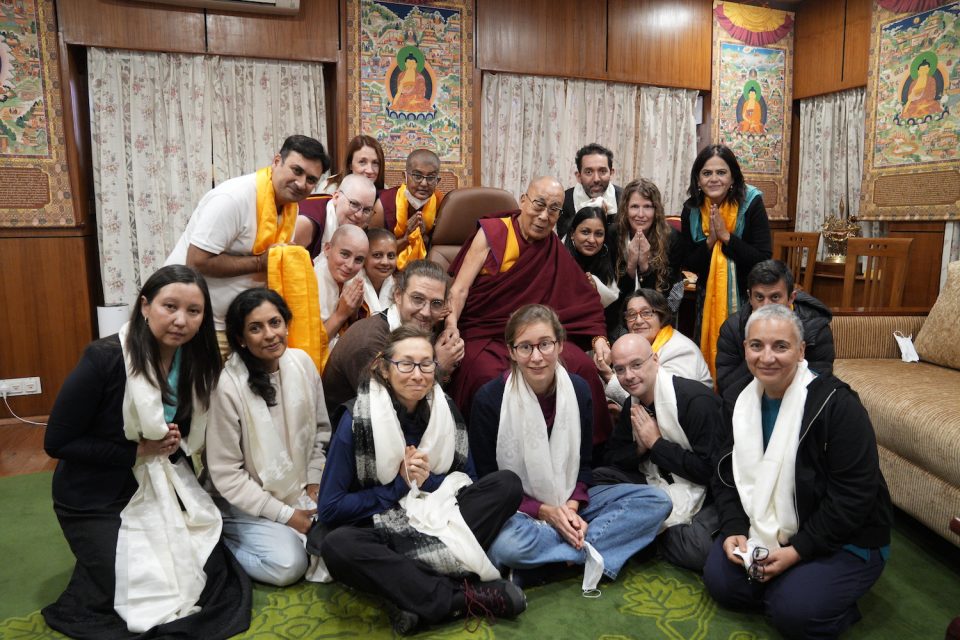
Members of the UBI/ILTK debate class meeting His Holiness the Dalai Lama in Dharamsala, India, 2022, who expressed his joy that we were learning Nalanda debate in their own languages.
The tradition of Buddhist debate originated in Nalanda University in the 5th century CE in Bihar, India. The historical Buddha, Shakyamuni, famously encouraged students to investigate the teachings through reasoning, saying, “Do not accept what I say on faith, but test it as a goldsmith tests gold—cutting it, rubbing it, melting it—and only then accept it as valid.” Nalanda Tradition Debate is a framework designed to expose inner doubts and contradictions as one tests the Buddha’s teachings with one’s own experiences, with the intention of leading both oneself and others to valid cognitions of reality and the realization of emptiness. It is dynamic, relevant, and practical in everyday life —and only recently became available in languages other than Tibetan.
Two current students of the Nalanda debate course offered by The Italian Buddhist Union (UBI) in cooperation with Istituto Lama Tzong Khapa, Ven. Thubten Chöying and Henrik Frölund share with us some insightful perspectives on the topic below:
Is Nalanda debate for me?
If you’re familiar with Nalanda Tradition Debate, you might not have gotten involved because it seems like something only done in monasteries or only in Tibetan. Maybe you didn’t know there are growing opportunities to learn in English and other languages. Or maybe it just seems too intellectual and complicated. Perhaps you’re not familiar with it at all, and aren’t sure how to learn more.
We thought we could help address those concerns along with our fifth year international classmates in the online Nalanda debate program originally created by Istituto Lama Tzong Khapa and taught by Dr. Atisha Mathur with the help of tutors Ven. Tenzin Drolma, Ven. Tenzin Kunsang, and others. While we are mostly describing this program, many of us have participated in other additional shorter debate programs, and so are including those experiences as well.
Is Nalanda debate needed when I’ve done Buddhist study already?
Consider the benefits of learning debate with an excellent teacher, as described by Bee Lan Lim (USA): “Joining the ILTK debate course was one of the best decisions I made in studying Buddhism. I realized then I had done it backwards, and the class filled a major gap, especially when it was taught by Atisha Mathur. Atisha-la has a brilliant mind and a brilliance with words. His debate classes trained me to properly investigate Buddha’s teachings before accepting them. I think everyone should learn debate as a way to learn critical thinking. It is a basic skill to debunk lies that we tell ourselves and others.”
Also, Shmuel Ruppo (Israel) said, “I study debate in general, and with Atisha specifically, because it enables me to be challenged on my understanding of Dharma. Often, my understanding is lacking—whether uncertain, vague, imprecise, just plain wrong, or even contradictory to what the texts say or to basic facts about reality! Putting my understanding on the spot, with me trying to defend it and others challenging me, makes it much more likely for me to change my understanding …
“For example, I can find out that I hold a position strongly, but for no reason at all – just by virtue of it being said often enough by my teachers. It requires help from the outside to make this crystal clear to me, and actually begin to seek necessary reasons for my views.”
Rimpi Jindal (India) tells us how, after many years of studying the Dharma: “It changed a lot. Before, I thought Dharma was mostly about learning the teachings and trying to follow them. But through debate, I realized it’s actually a very investigative process. You’re encouraged to question everything, analyze, and reason it out for yourself. That gave me so much confidence because it’s not blind faith – it’s about understanding deeply. Now I see Dharma as something alive, something you can really test and apply in everyday life.”
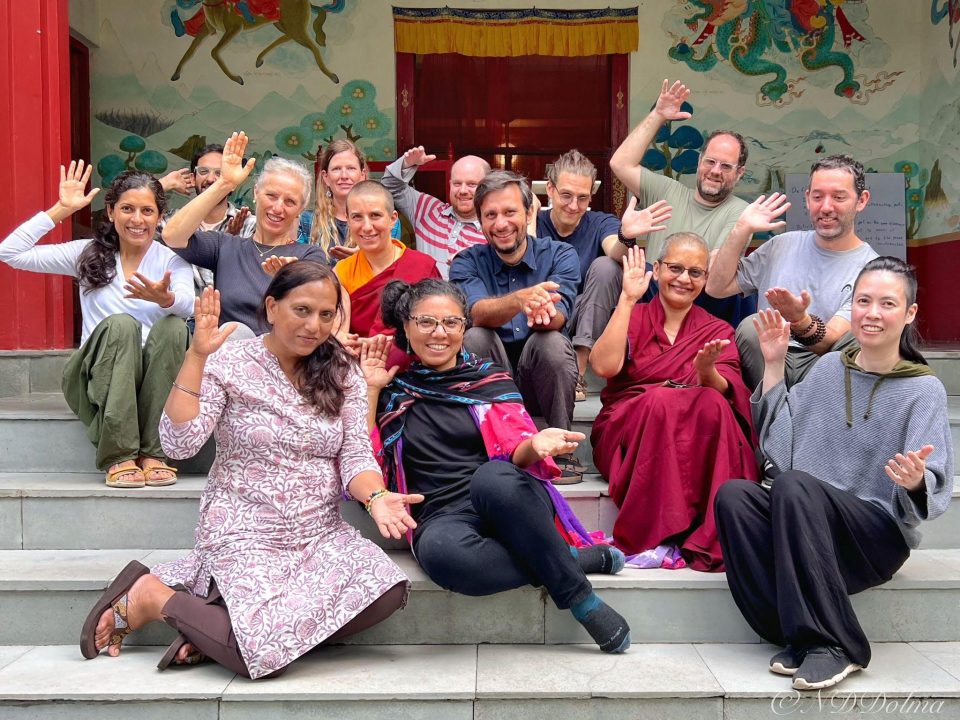
Celebrating another successful debate retreat with students from three different years at Thösamling Nunnery, Dharamshala, 2024. Photo courtesy of Thösamling Nunnery, Institute, and Retreat Center.
Is Nalanda debate only for Buddhists?
The practice and topics of debate are both used to engage with reality and question our assumptions regarding what we perceive, which is important regardless of whether someone is Buddhist or not.
“As a non-Buddhist,” Sabrina Zanetti (Italy) explained, “I can recommend debate to anyone interested in fostering a clearer, more critical mind. It is not necessary to have studied Buddhist topics previously: all the necessary information is provided gradually by the teachers. Step by step we grow to understand that a large part of the information normally used to make decisions or make judgments is taken for granted. What seemed like solid ground becomes unstable, and people look for different reasons to support their beliefs. We gain a method to give ourselves a more conscious orientation in the bombardment of information to which we are subjected. And on top of all this, Atisha Mathur is a teacher who presents topics that have been studied in depth for a long time with great passion and enthusiasm, with the help of valid tutors and sharing a path in a climate of great collaboration with the other students.”
Is Nalanda debate too intellectual to be helpful to me?
While words like “logic,” “reasoning,” “valid cognition,” and even “debate” sound like topics that would only interest intellectuals and erudite scholars, in the Tibetan monasteries and nunneries, even young teens learn Nalanda debate.
Karen D.C. (Belgium) found that debate helps in all her decision-making. “Debate is helpful for those who, like me, overthink and doubt a lot about small or large decisions in life. I used to desperately want to give ‘the right answer’ and then be undecisive, but through debating I have noticed that it is better to give a ‘wrong’ answer than to not answer. When an answer doesn’t work, that will become clear as the debate continues and then I can change my mind. But if I don’t answer, nothing becomes clear. Experiencing that in debate, made it easier for me to take other decisions more lightly as well…Also I find [I’m] learning to really think for myself and not be swayed just because many other people say otherwise.”
“For me,” Rimpi added, “the most rewarding thing has been noticing little changes in how I respond to life. I still have ups and downs, but things that used to really upset me don’t feel as heavy anymore. I pause more before reacting and sometimes I actually choose patience or kindness when before I would’ve gotten annoyed. It’s those small shifts that feel so powerful because they show that the practice is working, it’s not just theory, it’s changing how I live.”
Is Nalanda debate just like having a discussion?
It is amazing how many arguments start with two people having different definitions of the same term – which means that they are actually discussing two different things. On top of that, they have no structure where these discrepancies come to light and thus frustration and anger develop.
Naga Dhoopati (USA) sees it like this: “In normal society or in our political debates, we see [discussions and] debates become one person making statements to please their audience or oppose the other person, without any valid reasoning. In Nalanda debate, one is not trying to win over the other person or get cheers from the audience by making a statement. Here you are taking the responsibility of pulling the other person out of samsara through valid reasoning and making them look at a statement, a syllogism, with different possibilities.”
Is Nalanda debate too conceptual? I like to meditate.
The connection between meditation and debate is perhaps not clear to everyone, and some even believe them to be in contradiction. Common misperceptions about meditation are that the purpose is simply to empty the mind of thoughts, or that liberation can be attained through only concentration meditation. According to the Buddha’s teachings, to realize emptiness, it’s necessary to combine concentration and analysis. In order to understand why this is necessary for liberation, one needs to use conception to analyze the teachings. Nalanda Debate is a powerful and effective method designed exactly for these purposes.
Elroy Fernandes (India) expressed how debate benefitted his meditation. “My debate practice has enhanced my ability to grasp the object of meditation. While I don’t claim full understanding, it has become easier for me to identify the object when contemplating non-self. I credit this clearer insight to my experience with debate.”
Sabrina agreed that “The conceptual mind must be overcome. But,” she continued, “for me it is an indispensable tool for analyzing how to overcome it. Choosing the right path to obtain a result is not an easy choice: the aspects of the path itself and its object must be clearly identified. The best tool to do all this is a detailed analysis, and the debate teaches me exactly this. In a second moment, once I have identified the object, I will be able to make it an instrument of my meditation. Without forgetting that the debate, requiring concentration on its object, is already a form of meditation. They are not two separate paths, two different and contradictory ways of obtaining a result. Instead, they are in close collaboration, indeed. In my opinion, debate is really necessary, because it helps to identify errors and eliminate them.”
Henrik (one of the authors), shares his view on the subject: “In the end, all meditation will be an effect of some form of reasoning since you need to have a reason to sit there in the first place. Faulty reasoning with regards to the goal of your practice will at some point produce a doubt in your mind and at that point the debate starts again. We can’t just suppress the doubts with ‘Buddha said so’ or some ready-made statement from a teacher – it might distract your doubting mind for a while, but in the end only correct reasoning resulting in inferential valid cognition will be enough.”
As Zarina Osmonalieva (Sweden) puts it: “I really recommend everyone who is studying Dharma to understand the basic principles of debate and put aside fears that it is too intellectual or too conceptual. Without changing the rational mind, according to Buddhist psychology, it is very difficult to develop deep realizations.”
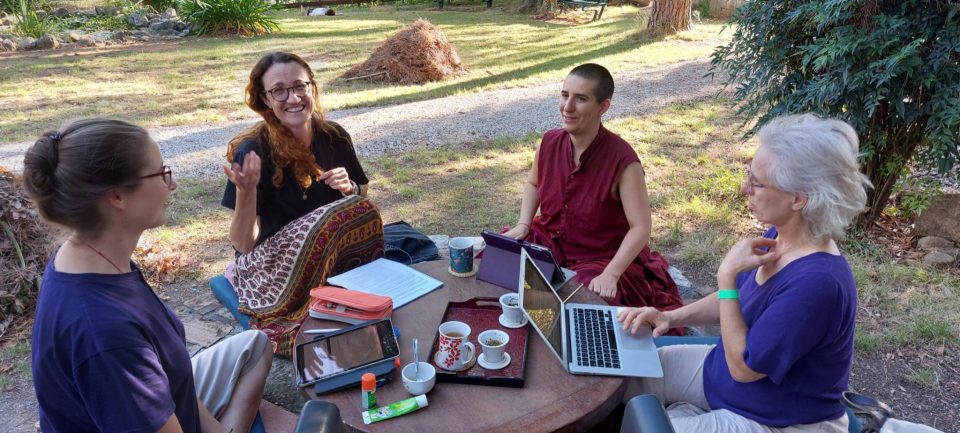
Ven. Lobsang Kunsang tutoring students in the ILTK tea garden during an in-person retreat. Photo courtesy of Ven. Thubten Chöying.
Do I need Nalanda debate when I already have excellent teachers?
No doubt there are excellent teachers giving precious and complete teachings, but are we always the best listeners?
Karen D.C. describes an interesting analogy from His Holiness. “Over the course of the years, I have noticed a gradual change in the way I was listening to dharma teachings. Even though I didn’t really notice at that time, I used to accept quite a lot of what was said blindly. I investigated in some ways, but I lacked the ability to properly question and investigate. His Holiness often makes the analogy of eating without teeth.
After learning debate for some time, I started to notice how many things actually weren’t clear to me during Dharma teachings, how many doubts I had, how many open questions were remaining. I really started to miss the debate approach when it wasn’t there. I felt uncomfortable leaving all these doubts unaddressed. His Holiness compares approaching the Buddha’s teaching using debate to having teeth to eat food, one is able to chew the teachings and investigate them. This is how I felt and still feel, and I am really grateful for that.”
Seeing it as the key to staying with her studies, Patrizia Miroballo (Italy) said, “As for the study of the Dharma, I probably would not have continued for a long time without logic and debate, because I feel that, for me, it is the only way I can have the opportunity to understand things correctly and in a deeper way.”
Erez (Israel) sees a marked difference in his engagement with the Dharma. “My personal experience is you get to develop the ability to understand the philosophical debates way deeper than before. Now I’m able to actually dissect parts of text and argue for and against its meaning rather that just memorise what Geshe-la said and hope not to forget it. Highly recommended but bring patience with you.”
Is Nalanda debate real practice? I want Dharma experiences.
Whether our practice is working or not comes down to how it affects our daily life, and students have seen very practical results. The real work is in the mind, and speaking candidly, Shmuel shared how, “If a view feels emotionally rewarding, it is easy to strongly hold it without good reason. But if something is true, it does not follow that it will necessarily feel pleasant – the interaction in debate can act as bitter medicine to realize that one’s understanding is actually wrong.”
Patrizia found that, “At the beginning, the debate was a real surprise: such a fun way to study difficult topics and at the same time to train the mind in becoming more sharp and clear!
In ordinary life it happened that I had a better ability to evaluate situations in detail and quickly find the best solutions.”
Naga saw many positive changes in her daily life. “In my out-of-the-classroom experiences, I realized how the debate study has helped me articulate right speech in work environments, improve my listening skills, analyze better, and help others in their health and well-being…It has been a wonderful opportunity to study with so many wonderful students, who became best of friends through these debate courses.”
Rimpi related a personal change in her view that happened during debate: “One of my best memories is from a debate session where I learned about the concept of ‘isolates.’ While debating, I realized that a person can have many different roles or identities at the same time. We often have high expectations from our friends and family, but we don’t always understand the different roles they might be juggling. Learning about this concept and applying it in real life helped me see things more clearly and helped me to improve my relationship with friends and family. That moment was both exciting and humbling, and it truly changed the way I approached debates after that.”
Maybe Nalanda debate is not for me.
In a way, that is exactly right, because it is the best method for realizing selflessness – there’s no inherent “me” that it’s for. On the compassion side, if we are developing a genuine understanding of emptiness, it will only help to soften our hearts as well, and bring us closer to others.
Venerable Tenzin Paldron (India) shares: “Although I still feel very much like a novice trying to find her feet in the marshy swamp of my afflictions, I am very grateful for the opportunity I received over the years, to develop this essential tool of logic and reasoning to see things more clearly and compassionately.
It has also enhanced within me a willingness and a determination to do whatever it takes to continue to hone this skill to attain fearlessness and happiness for myself and for others, thus fulfilling the wishes of His Holiness the Dalai Lama and my teachers to become a genuine 21st century spiritual practitioner.”
Exploring Nalanda Debate Further
Here are some ways you can learn debate and see if it benefits your practice in the ways discussed above.
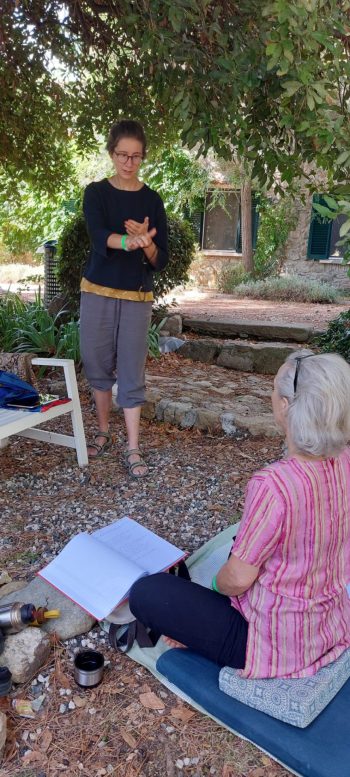
Karen De Causmaecker challenges classmate Paola Zuin while debating in ILTK’s tea garden. Photo courtesy of Ven. Thubten Chöying.
The Art of Reasoning in the Nalanda Tradition, Italy
The course created by ILTK is now offered by The Italian Buddhist Union (UBI) in cooperation with ILTK, Italy and offered in both English and Italian, online with annual in-person retreat.
When: Online open day on September 5/6; classes start October 2025
Teacher and Tutors: Dr. Atisha Mathur, Ven. Lobsang Kunsang, Duccio Pescini, Henrik Frölund
Please learn more about this course.
Exploring the Fundamentals of Reasoning and Debate at Ocean of Compassion, CA, USA
This course offered by Ocean of Compassion Buddhist Center is available online and in-person
When: Starting September 15
Teacher: Geshe Tenzin Legtsok
Please learn more about this course.
Debate School at Sera Je Monastery, India
Programs available online and in-person.
Teachers and Coaches: Geshe Thabkhe, Ven. Losang Donyo, Ven. Lobsang Kunzang, Ven. Tenzin Lekzom, Archhana Kombrabail, and other monk coaches and mentors.
Please learn more about the Sera Je Debate School.
We gratefully thank Ven. Thubten Chöying and Henrik Frölund for this thoughtful piece about Nalanda debate!
Ven. Thubten Chöying (Sarah Brooks, USA) is an IMI nun, a current student of UBI/ILTK’s online debate course and ILTK’s FPMT Masters Program, board member of Associazione Monastica Sangha Lhungtok Choekhorling, former Foundation Service Seminar and Inner Job Description trainer, and has served in FPMT centers and projects since 1998.
Henrik Frölund (Sweden) is a student of UBI/ILTK’s Debate Course since 2021, and is also a tutor for the newer students of that program.
We welcome the submission of news stories from those within the FPMT community. This can be a story about something you have personally completed or accomplished, about someone else who has done so, or about the FPMT center, project, or service of which you are a part. Ideal submissions will give readers reasons to rejoice, share ideas, and create connections between those in the international community. Have something to share? Please let us know!
Foundation for the Preservation of Mahayana Tradition (FPMT), is a Tibetan Buddhist organization dedicated to the transmission of the Mahayana Buddhist tradition and values worldwide through teaching, meditation and community service.
- Tagged: debate, nalanda debate
- Home
- News/Media
- Study & Practice
- About FPMT Education Services
- Latest News
- Programs
- New to Buddhism?
- Buddhist Mind Science: Activating Your Potential
- Heart Advice for Death and Dying
- Discovering Buddhism
- Living in the Path
- Exploring Buddhism
- FPMT Basic Program
- FPMT Masters Program
- FPMT In-Depth Meditation Training
- Maitripa College
- Lotsawa Rinchen Zangpo Translator Program
- Universal Education for Compassion & Wisdom
- Online Learning Center
- Prayers & Practice Materials
- Overview of Prayers & Practices
- Full Catalogue of Prayers & Practice Materials
- Explore Popular Topics
- Benefiting Animals
- Chenrezig Resources
- Death & Dying Resources
- Lama Chopa (Guru Puja)
- Lama Zopa Rinpoche: Compendium of Precious Instructions
- Lama Zopa Rinpoche: Life Practice Advice
- Lama Zopa Rinpoche Practice Series
- Lamrim Resources
- Mantras
- Prayer Book Updates
- Purification Practices
- Sutras
- Thought Transformation (Lojong)
- Audio Materials
- Dharma Dates – Tibetan Calendar
- Translation Services
- Publishing Services
- Teachings and Advice
- Find Teachings and Advice
- Lama Zopa Rinpoche Advice Page
- Lama Zopa Rinpoche: Compendium of Precious Instructions
- Lama Zopa Rinpoche Video Teachings
- ༧སྐྱབས་རྗེ་བཟོད་པ་རིན་པོ་ཆེ་མཆོག་ནས་སྩལ་བའི་བཀའ་སློབ་བརྙན་འཕྲིན།
- Podcasts
- Lama Yeshe Wisdom Archive
- Buddhism FAQ
- Dharma for Young People
- Resources on Holy Objects
- Ways to Offer Support
- Centers
- Affiliates Area
- Teachers
- Projects
- Charitable Projects
- Make a Donation
- Applying for Grants
- News about Projects
- Other Projects within FPMT
- Support International Office
- Projects Photo Galleries
- Give Where Most Needed
- FPMT
- Shop
Translate*
*powered by Google TranslateTranslation of pages on fpmt.org is performed by Google Translate, a third party service which FPMT has no control over. The service provides automated computer translations that are only an approximation of the websites' original content. The translations should not be considered exact and only used as a rough guide.True religion should be the pursuit of self-realization, not an exercise in the accumulation of facts.







